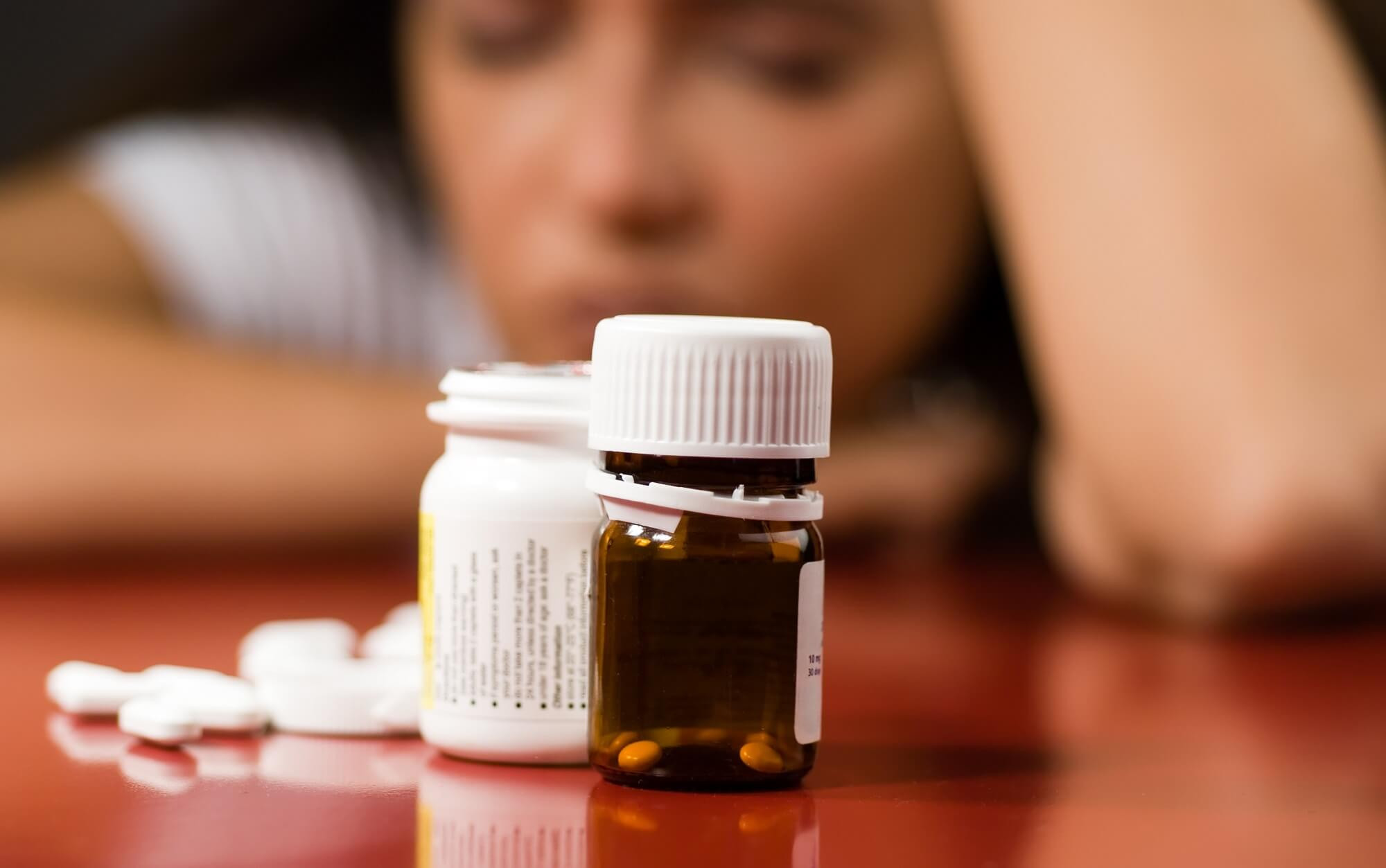Definisi
Drug-induced mood disorders atau gangguan mood yang diipicu oleh obat; merupakan gangguan suasana perasaaan atau mood yang dapat disebabkan oleh penggunaan obat-obatan medis, narkotika, alkohol, atau zat psikoaktif lainnya. Gangguan ini dapat berupa depresi atau mania. Depresi adalah perasaan sedih yang mendalam, sementara mania adalah suasana hati yang semangat, gembira, dan/atau marah secara berlebihan.
Gangguan suasana perasaan akibat zat/obat dapat terasa sangat buruk dan berlangsung sekitar 1 bulan sejak penggunaan obat atau putus obat. Pada gangguan depresi, dapat ditemukan hilangnya minat atau kesenangan dalam hidup.
Ironisnya, biasanya orang mengonsumsi narkoba untuk merasa lebih baik. Namun pada kondisi ini, obat tersebut justru membuat kondisi mereka menjadi lebih buruk. Orang terkadang tidak menyadari bahwa depresi yang timbul diakibatkan oleh alkohol dan obat-obatan yang dikonsumsinya karena mereka mengira bahwa zat-zat tersebut hanya dapat menimbulkan emosi positif.
Penyebab
Berbagai macam zat psikoaktif dapat menyebabkan gangguan mood akibat zat, yaitu:
- Depresan seperti alkohol, zat sedatif-hipnotik, dan anti nyeri dapat menginduksi euforia (gembira), penurunan kontrol, atau ketidakstabilan suasana hati. Pada fase putus obat dapat timbul agitasi (marah), mudah tersinggung, dan disforia (tidak bahagia)
- Stimulan seperti kokain dan amfetamin dapat menyerupai gangguan bipolar dengan gejala euforia, merasa berenergi, tidak nafsu makan, merasa hebat, dan paranoid (takut berlebihan). Pada fase putus obat dapat timbul anhedonia (sulit menikmati kesenangan), apatis (tidak peduli), penurunan suasana hati, dan ide bunuh diri
Sedangkan obat-obatan yang dapat menyebabkan depresi yang diinduksi zat adalah obat golongan steroid, L-dopa, antibiotik, obat saraf pusat, obat dermatologi, kemoterapi, obat imunologi atau untuk sistem kekebalan tubuh, obat antivirus, obat kardiovaskular, turunan asam retinoat, antidepresan, anti kejang, obat anti migrain, antipsikotik, obat hormonal, dan obat berhenti merokok.
Faktor Risiko
Faktor risiko dari gangguan ini antara lain:
- Riwayat keluarga gangguan mood atau gangguan penggunaan obat
- Pasien gangguan mood primer seperti depresi mayor, depresi menetap, atau bipolar
- Wanita. Wanita diketahui lebih berisiko mengalami depresi pada awal masa remaja
- Pasien geriatri atau pasien lansia. Geriatri cenderung lebih banyak mengkonsumsi obat-obatan medis dibanding orang yang lebih muda
Gejala
Gejala dan tanda gangguan depresi yang diinduksi obat antara lain:
- Merasa sedih
- Insomnia
- Merasa bersalah
- Merasa tidak punya harapan
- Mudah tersinggung
- Tidak bertenaga
- Retardasi psikomotor
- Penurunan libido
- Penurunan nafsu makan
- Ide bunuh diri
Sementara pada gangguan mania yang diinduksi obat, tanda dan gejalanya adalah:
- Merasa hebat dan terkenal
- Merasa selalu berenergi
- Impulsif
- Berbicara dengan lantang
- Pikiran yang cepat
- Berganti-ganti pasangan seks
- Mudah tersinggung
- Insomnia
Diagnosis
Ketika dokter mendiagnosa gangguan mood akibat zat/obat, dokter akan memastikan terlebih dahulu bahwa gangguan mood belum pernah terjadi sebelum pasien menggunakan alkohol atau obat-obatan. Hal ini dilakukan karena ada beberapa tipe gangguan mood. Jika gejala sudah muncul sebelum penggunaan zat, gangguan tersebut tidak termasuk gangguan mood yang diakibatkan oleh zat.
Pada beberapa kasus, gejala dapat muncul beberapa saat setelah penggunaan obat. Bahkan, ada gejala yang sebenarnya sudah dimulai sejak pengguna mencapai “puncak” saat sedang menggunakan obat. Selain itu, gejala juga sering terjadi pada kondisi putus obat. Namun, gangguan mood yang disebabkan karena putus obat biasanya akan membaik dalam beberapa hari setelah berhenti minum obat. Sedangkan pada gangguan mood yang disebabkan oleh zat, suasana hati dapat dimulai sejak putus obat dan dapat berlanjut hingga orang tersebut melakukan detoksifikasi.
Umumnya, diagnosis tidak ditegakkan jika terdapat riwayat gangguan mood sebelum menggunakan zat atau gejala menetap lebih dari sebulan setelah berhenti menggunakan zat. Untuk menegakkan diagnosis, harus ditemukan gejala berat yang tidak berhubungan dengan intoksikasi atau putus zat. Misalnya, mungkin terdapat perubahan suasana hati yang signifikan yang mempengaruhi kehidupan orang tersebut, menyebabkan banyak penderitaan, atau merusak beberapa aspek kehidupannya.
Tata laksana
Ketika dicurigai adanya gangguan mood akibat zat, umumnya disarankan untuk menghentikan zat atau agen penyebab. Saat melakukannya, dokter harus mempertimbangkan risiko penghentian obat seperti kondisi klinis dari penyakit yang sedang diobati dengan agen penyebab. Jika pasien benar-benar membutuhkan obat untuk penyakitnya, pertimbangkan obat alternatif yang memiliki efek sama namun toksisitasnya lebih rendah. Jika tidak ada obat alternatif, turunkan dosis obat dan/atau perpendek durasi pengobatan sesuai indikasi medis.
Pengurangan obat secara bertahap juga harus dipertimbangkan, terutama jika obat dapat menimbulkan sindrom putus obat, seperti pada obat golongan benzodiazepin atau antidepresan serotonergik. Jika gejala tidak mereda dalam waktu 4 minggu setelah obat dihentikan sepenuhnya, pikirkan penyebab gangguan mood lainnya. Percobaan ulang penggunaan obat dengan pengawasan yang ketat dapat dipertimbangkan pada keadaan tertentu, seperti jika obat itu efektif dalam mengobati penyakit medis yang parah.
Ajarkan pasien mengenai hal-hal berikut, terutama jika terjadi penyalahgunaan zat:
- Penyebab gangguan mood. Pasien dan keluarga harus mengetahui penyebab gangguan mood sehingga dapat mencegah episode tambahan dan keluarga dapat membantu memantau pasien jika muncul kekambuhan
- Prognosis atau kemungkinan perjalanan penyakit selanjutnya, biasanya terkait dengan kesembuhan
- Menghindari agen penyebab
Jika suatu zat atau obat menyebabkan gangguan mood, menghentikan penggunaan obat biasanya akan mengembalikan kondisi pasien seperti saat sebelum menggunakan zat atau obat tersebut. Perbaikan gejala terjadi secara bertahap, namun biasanya kurang dari 4 minggu. Gejala yang belum membaik dalam 4 minggu setelah menghentikan penggunaan obat dapat menunjukan adanya gangguan mood primer. Pemantauan ketat harus dilakukan sampai gejala hilang secara total.
Komplikasi
Berikut ini adalah komplikasi dari gangguan mood yang diinduksi obat:
- Bermasalah dengan orang lain
- Kehilangan waktu kerja
- Pembunuhan. Pada beberapa situasi yang jarang terjadi, seseorang yang mengalami depresi atau manik dapat menjadi pembunuh. Jika pasien sudah sampai menyakiti diri sendiri atau orang lain, pasien harus dirawat inap.
- Perawatan di rumah sakit yang berkepanjangan
- Bunuh Diri
Penilaian rutin untuk risiko bunuh diri adalah wajib bagi setiap pasien depresi atau mania. Faktor risiko lain untuk bunuh diri adalah agitasi, psikosis, percobaan bunuh diri di masa lalu, riwayat keluarga bunuh diri, dan penyakit psikiatrik lainnya.
Pencegahan
Pengobatan pencegahan untuk gangguan mood yang diinduksi obat dapat direkomendasikan jika ada risiko signifikan pada obat yang sedang digunakan. Hal-hal berikut perlu dipertimbangkan ketika memberikan pengobatan pencegahan:
- Riwayat kesehatan pasien. Episode afektif sebelumnya merupakan indikator peningkatan risiko gangguan mood yang diinduksi obat
- Tingkat risiko gangguan mood terkait pengobatan yang sedang digunakan
Beberapa jenis obat pencegahan antara lain:
- Antidepresan selective serotonin-reuptake inhibitor (SSRI) untuk mencegah depresi yang diinduksi oleh obat IFN-alpha
- Obat antipsikotik untuk mencegah gejala mania yang diinduksi obat golongan steroid
Depresi atau mania yang diinduksi obat-obatan dapat memburuk dan mengancam jiwa. Kasus bunuh diri rentan terjadi. Jika pasien mengalami gejala gangguan mood setelah penggunaan suatu obat, hentikan obat dan hindari obat itu jika memungkinkan.
Kapan harus ke dokter?
Jika Anda atau kerabat mengalami gejala gangguan mood seperti yang disebutkan di atas setelah penggunaan obat atau zat tertentu, segera berkonsultasi dengan dokter atau psikiater. Jika gejala memburuk dan muncul ide atau perilaku menyakiti diri sendiri, orang lain, bunuh diri, atau membunuh, segera hubungi nomor darurat wilayah Anda atau membawa pasien ke unit gawat darurat.
- dr Anita Larasati Priyono
Substance-Induced Mood Disorder: Overview, Substances Linked to Depression or Mania, Etiology. (2023). eMedicine. [online] Available at: https://emedicine.medscape.com/article/286885-overview#a1 [Accessed Feb. 1, 2022].
Revadigar, N. and Gupta, V. (2021). Substance-Induced Mood Disorders. [online] PubMed. Available at: https://www.ncbi.nlm.nih.gov/books/NBK555887/#:~:text=Substance%2Fmedication%2Dinduced%20mental%20disorders%20refer%20to%20depressive%2C%20anxiety. [Accessed Feb. 1, 2022].
https://www.facebook.com/verywell (2019). How Substance Abuse Can Lead to Mood Disorders. [online] Verywell Mind. Available at: https://www.verywellmind.com/substance-medication-induced-depressive-disorder-21931. [Accessed Feb. 1, 2022].











